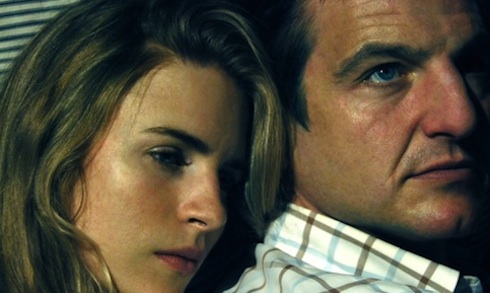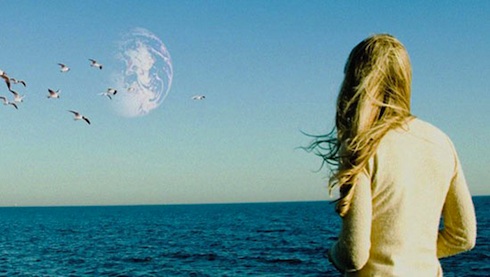Determining the dramatic function of science fiction in a visual medium must be a daunting task for a filmmaker. Any “serious” films with science fiction elements are almost always notably different from their big budget counterparts insofar as the characters, not the high concepts take center stage. In a serious science fiction film like Primer or Contact or Gattaca the explosions and chase sequences are usually few while close-ups of characters faces and people delivering long speeches are plentiful. In these two ways Another Earth should totally be a serious science fiction movie, but despite being a really moving and a fine film, its science fiction premise is only a gimmick.
Spoilers Ahead!
The movie tells the story of a recent high school graduate named Rhoda (Brit Maling) who crashes her car drunkenly into another car which results in the death of a mother and a child and sends the father/husband John into a coma. This happens on the same night as a duplicate planet Earth is spotted in our night sky. (It starts out as a blue dot and gets increasingly larger, though this size increase is never explained.) Rhoda serves four years in prison for manslaughter presumably, and in that time the world has become increasingly interested with Earth 2. They even make radio contact with it in a particularly cool scene in which a SETI scientist speaks to her Earth 2 counterpart over the radio. Further, an organization reminiscent of Richard Bransons’ Spaceship One initiative have set up an essay contest to select people to fly on the first mission to Earth 2. Rhoda, being someone who is into outer space, complete with a dogged-eared Asimov novel on her desk, enters the contest.
However the stuff with the essay contest and the world trying to communicate with Earth 2 are pretty secondary to what really takes up most of the movie. Rhoda is wracked with guilt over her actions and heads to apologize to John. However, she’s too scared and instead tells him that she is there to offer a free cleaning of John’s house as a part of a trial cleaning service she works for. (Rhoda is really working a job doing janitorial work at a nearby high school.) Because John is a mess and clearly drinks all the time, he accepts. Rhoda does her best to clean up the house and upon an invitation from John; she returns and cleans again and again and again. They start to develop a strange relationship and the writing is on the wall pretty quickly for them to become lovers. Naturally, the conflict is set up to determine if Rhoda will eventually reveal to John that she caused the death of his family, or not. When she wins the contest and has an opportunity to go to Earth 2, she breaks down and tells him. This results in him becoming furious and her eventually offering her ticket to him as things on Earth 2 might be different. His family might be alive there.

In terms of character arcs and emotional dialogue, one can immediately see why Another Earth is receiving praise not only from critics but from the Sundance people as well. (The film won both the special Jury Prize and Alfred P. Sloan Prize at Sundance this year.) This praise is totally deserved in a cinematic sense because the performances from the two lead actors (Brit Marling and William Mapother) are fantastic as is the direction from Mike Cahill. The movie is pretty to look at and haunting and sad and well scored and everything you would expect from a movie that wins such prestigious film-oriented awards. Also, a small supporting role from Kumar Pallan (of Wes Anderson fame) as one of Rhoda’s janitor co-workers is totally heartbreaking and perfect.
But the movie doesn’t really work, because the stuff with Earth 2 feels like a cheesy metaphor. If the idea of a duplicate Earth appearing in orbit around us was integral to the emotional arc of these characters, I would say the movie works. But the notion that things might be different on the duplicate Earth is introduced pretty late in the movie. Further, not much is actually said about how people are responding to this or why it is even happening. I don’t have a big problem with the scientific improbability of the premise (obviously another planet that close to us would seriously mess with gravity) but what I do have a problem with is the fact that the premise isn’t really earned emotionally. It’s just a big old metaphor hanging in the background of every scene. A metaphor for what you ask? Everything? Humanity? Our choices? Alll of this strikes me as a little trite.
As it stands, this premise can be removed wholesale and the story of Rhoda and John would be pretty much the same. But because it’s in there, it makes the movie feel like a gimmick and less of a film that it could be. It’s either a missed opportunity as an indie drama, or a missed opportunity as a science fiction film. Probably both, because surely a mash-up exists, which is what this movie tried to do. But it didn’t try in ways that were creative or definitive. It was as though the movie were asking a bunch of big life questions through the lens of this premise, but refusing to explore those questions through the same lens.
The audience never gets to see Earth 2, though we are given a big hint that things ARE different there as the audience is confronted with (MASSIVE SPOILER) a duplicate Rhoda in the last 30 seconds of the film. Does this mean John’s family is alive in the other Earth? Well, even if they are, that means there are two of him there, too, which is a totally different kettle of fish. Why didn’t the filmmakers choose to go to Earth 2 sooner? What if they found out it was inverted there and John was dead and the mom was alive? What if John and Rhoda were lovers on Earth 2 AND his family was still alive because they met some other way? What if Rhoda didn’t kill the family drunkenly and turned out to be a a boring, vapid person? All of these plots would have been a little bit more interesting, and I’d argue, just as emotionally resonant as the one we were given. Further, they would have all incorporated the science fiction premise into the film completely.
I feel bad criticizing this movie, as I’m constantly calling for science fiction films and television to be less violent, and less action oriented and more about character. I admit, Another Earth could be seen as a step in the right direction towards more humanistic, dramatic science fiction films. It certainly wasn’t a step back, but I’m not sure it was a step forward either. It was a fine film that moved me. But when I actually thought about the logistics of the movie, I was confused. And that confusion, like Earth 2 growing in the sky of this movie, got bigger and bigger and bigger. And then, the movie ended and I wasn’t left with emotional question to ponder. Instead, I was worried about cleaning my room and driving more slowly. Because really, that’s what the majority of the movie was about.
Ryan Britt is a staff writer for Tor.com.










